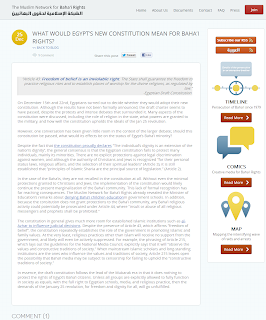Egypt's New Constitution: No Religious Freedom for Minorities
In today's post, The Muslim Network for Baha'i Rights, indicated that Baha'i Rights in Egypt will be gravely violated by Egypt's newly passed controversial constitution, which was passed by an Islamically dominated constituent assembly.
The post is titled: "What Would Egypt's New Constitution Mean for Baha'i Rights?" For ease of access, the full article is re-posted below.
It should be noted though that, in reference to the fourth paragraph of the post which addresses prosecution under [contempt of religion] article-44 of the constitution, it must be made very clear that Baha'is never engage in "insult or abuse of [all] religious messengers and prophets." Thus, any accusations or claims that might arise under such a "prohibition" or an "article" would be blatant fabrications. And according to recorded recent revelations by some of those participating in drafting the constitution, its wording is specifically intended to alienate religious minorities and put a final stop to any minimal freedoms or rights the Baha'is of Egypt might have left.
Here is the post:
The post is titled: "What Would Egypt's New Constitution Mean for Baha'i Rights?" For ease of access, the full article is re-posted below.
It should be noted though that, in reference to the fourth paragraph of the post which addresses prosecution under [contempt of religion] article-44 of the constitution, it must be made very clear that Baha'is never engage in "insult or abuse of [all] religious messengers and prophets." Thus, any accusations or claims that might arise under such a "prohibition" or an "article" would be blatant fabrications. And according to recorded recent revelations by some of those participating in drafting the constitution, its wording is specifically intended to alienate religious minorities and put a final stop to any minimal freedoms or rights the Baha'is of Egypt might have left.
Here is the post:
“Article 43: Freedom of belief is an inviolable right. The State shall guarantee the freedom to practice religious rites and to establish places of worship for the divine religions, as regulated by law.”
-Egyptian Draft Constitution
On December 15th and 22nd, Egyptians turned out to decide whether they would adopt their new constitution. Although the results have not been formally announced, the draft charter seems to have passed, despite the protests and intense debates that surrounded it. Many aspects of the constitution were discussed, including the role of religion in the state, what powers are granted to the military, and how well the constitution upholds the ideals of the Jan 25 revolution.
However, one conversation has been given little room in the context of the larger debate; should this constitution be passed, what would its effects be on the status of Egypt’s Baha’i minority?
Despite the fact that the constitution proudly declares “The individual’s dignity is an extension of the nation’s dignity”, the general consensus is that the Egyptian constitution fails to protect many individuals, mainly its minorities. There are no explicit protections against legal discrimination against women, and although the authority of Christians and Jews is recognized “for their personal status laws, religious affairs, and the selection of their spiritual leaders” (Article 3), it is still established that “principles of Islamic Sharia are the principal source of legislation.
” (Article 2).
In the case of the Baha’is, they are not recalled in the constitution at all. Without even the minimal protections granted to Christians and Jews, the implementation of the constitution would likely continue the present marginalization of the Baha’i community. This lack of formal recognition has far reaching consequences. The Muslim Network for Baha’i Rights already revealed the Minister of Education’s remarks about denying Baha’i children education in government schools. In addition, because the constitution does not grant protections to the Baha’i community, any Baha’i religious activity could potentially be prosecuted under Article 44, where “insult or abuse of all religious messengers and prophets shall be prohibited.”
The constitution in general gives much more room for established Islamic institutions such as al-Azhar to influence judicial decisions. Despite the presence of Article 43, which affirms “freedom of belief”, the constitution repeatedly establishes the role of the government in promoting Islamic and family values. At the very least, religious practices other than Islam will receive no support from the government, and likely will even be actively suppressed. For example, the phrasing of Article 215, which lays out the guidelines for the National Media Council, explicitly says that it will “observe the values and constructive traditions of society.” When mainstream Islamic scholars and long-standing institutions are the ones who influence the values and traditions of society, Article 215 leaves open the possibility that Baha’i media may be subject to censorship for failing to uphold the “constructive traditions of society.”
In essence, the draft constitution follows the lead of the Mubarak era in that it does nothing to protect the rights of Egypt’s Baha’i citizens. Unless all groups are explicitly allowed to fully function in society as equals, with the full right to Egyptian schools, media, and religious practice, then the demands of the January 25 revolution, for freedom and dignity for all, will go unfulfilled.











